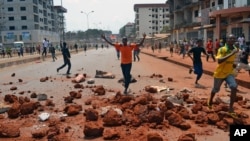The U.S. State Department is holding a roundtable Wednesday to gather input from groups working in Guinea about what action should be taken regarding the country’s continuously-delayed legislative elections.
Alliance Guinea co-founder Jennifer Swift-Morgan said her group will talk to officials about putting more pressure on the West African government to hold the votes. June 30 will mark ten years since voters in Guinea last voted on their parliament.
“We believe that there needs to be more pressure put on the Conde administration - and not just the Conde administration, but also the political parties in the opposition - to come to agreements on the finer points of conflict right now around the elections,” she said.
According to Swift-Morgan those conflicts are “technical, but, really more to the point, are political in nature, especially concerning the neutrality and transparency of the national electoral commission.”
In April, President Alpha Conde announced he was yet again postponing the legislative elections, which had been set for July 8. The votes were originally supposed to be held shortly after Conde’s election win in November 2010.
Swift-Morgan said opposition members are frustrated with the continued delays. But she added they are equally frustrated with what they say is strong bias in the supposedly independent election commission and problems with voter registration.
“The opposition party members themselves were talking about not supporting the July 8 date that Conde just announced had been changed,” she said. “Really what they’re protesting against is the conditions under which the elections were to be held.”
At the roundtable, Swift-Morgan said her group will discuss ways the international community, including the U.S., should step up pressure on Guinea. “There already exist certain economic pressures,” she said, referring to a pledge by the European Union to withhold debt relief assistance until legislative elections are held.
But she said additional measures may be helpful. “I don’t know if we’re prepared to propose that sanctions be placed on Guinea at this point, but I think that should be seriously discussed. We’ve seen recently in Mali that the threat of such sanctions can actually be quite effective in moving the needle.”
For now, Swift-Morgan said the country is controlled almost solely by the executive office.
“We’re also seriously concerned about the stability of the country - both politically, economically, and, frankly, if this goes on too much longer, we’re concerned about potential violence that could break out," she said. "And we believe that the U.S. and other members of the international community really need to do more to make this a point of pressure on the administration and the opposition to come to agreement.”
President Conde was elected in 2010, during Guinea's first free and fair presidential election since independence in 1958.
Alliance Guinea co-founder Jennifer Swift-Morgan said her group will talk to officials about putting more pressure on the West African government to hold the votes. June 30 will mark ten years since voters in Guinea last voted on their parliament.
“We believe that there needs to be more pressure put on the Conde administration - and not just the Conde administration, but also the political parties in the opposition - to come to agreements on the finer points of conflict right now around the elections,” she said.
According to Swift-Morgan those conflicts are “technical, but, really more to the point, are political in nature, especially concerning the neutrality and transparency of the national electoral commission.”
In April, President Alpha Conde announced he was yet again postponing the legislative elections, which had been set for July 8. The votes were originally supposed to be held shortly after Conde’s election win in November 2010.
Swift-Morgan said opposition members are frustrated with the continued delays. But she added they are equally frustrated with what they say is strong bias in the supposedly independent election commission and problems with voter registration.
“The opposition party members themselves were talking about not supporting the July 8 date that Conde just announced had been changed,” she said. “Really what they’re protesting against is the conditions under which the elections were to be held.”
At the roundtable, Swift-Morgan said her group will discuss ways the international community, including the U.S., should step up pressure on Guinea. “There already exist certain economic pressures,” she said, referring to a pledge by the European Union to withhold debt relief assistance until legislative elections are held.
But she said additional measures may be helpful. “I don’t know if we’re prepared to propose that sanctions be placed on Guinea at this point, but I think that should be seriously discussed. We’ve seen recently in Mali that the threat of such sanctions can actually be quite effective in moving the needle.”
For now, Swift-Morgan said the country is controlled almost solely by the executive office.
“We’re also seriously concerned about the stability of the country - both politically, economically, and, frankly, if this goes on too much longer, we’re concerned about potential violence that could break out," she said. "And we believe that the U.S. and other members of the international community really need to do more to make this a point of pressure on the administration and the opposition to come to agreement.”
President Conde was elected in 2010, during Guinea's first free and fair presidential election since independence in 1958.





